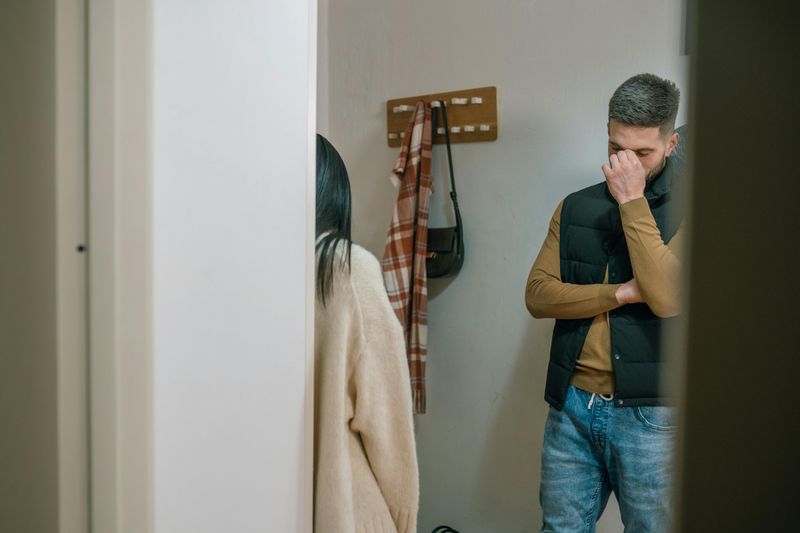Relationships change over time, and sometimes feelings fade. When women fall out of love but aren’t ready to address it directly, they often resort to little white lies to mask their true emotions. These untruths might seem harmless on the surface, but they actually signal deeper issues brewing beneath. Understanding these common deceptions can help couples recognize when it’s time for an honest conversation.
1. “Nothing’s wrong. I’m fine.”

Those three little words—”I’m fine”—often hide an emotional iceberg. She uses this automatic response when she doesn’t have the courage to voice her fading feelings or doesn’t want to deal with the fallout of honesty.
Her body language tells a different story: crossed arms, minimal eye contact, and a tight smile that doesn’t reach her eyes. Inside, she’s processing the disconnect between what she once felt and what remains now.
This phrase acts as her shield, buying time while she figures out her next move. It’s easier to claim everything’s okay than admit she’s walking away emotionally, one silent step at a time.
2. “I’m just tired, that’s all.”

Exhaustion becomes her universal excuse. She blames fatigue when she doesn’t want to be intimate, have deep conversations, or spend quality time together. The truth lurks behind those heavy sighs and early bedtimes.
Physical tiredness is real, but emotional fatigue from maintaining a relationship she’s no longer invested in drains her even more. She’s not just tired of the day—she’s tired of pretending.
When this excuse appears consistently over weeks or months, it’s rarely about needing more sleep. It’s about her heart quietly disconnecting while her words provide convenient cover.
3. “I’ve just been really busy lately.”

Suddenly her calendar overflows with commitments—work projects, family obligations, and personal errands consume every free moment. The mysterious busyness appears precisely when your relationship needs attention most.
People make time for what they value. When she consistently prioritizes everything else, it’s not about lack of hours—it’s about lack of desire to invest in your connection. Her schedule becomes the perfect alibi.
Watch for the pattern: she finds time for friends, hobbies, and social media scrolling but remains “too busy” for relationship maintenance. It’s not busyness—it’s her heart quietly backing away while her schedule takes the blame.
4. “I still love you, I’m just not great at showing it.”

This clever statement creates the perfect escape hatch. By acknowledging a failure to demonstrate love rather than a lack of it, she shifts blame to her expression skills instead of her actual feelings.
Love naturally seeks ways to show itself. When genuine affection exists, even the most emotionally reserved person finds ways to demonstrate care—small gestures, thoughtful words, meaningful glances.
The painful reality? She’s trying to be kind while creating distance. This explanation lets her maintain the relationship’s structure while emotionally checking out. It gives her permission to withhold affection without taking responsibility for her changed heart.
5. “I just need some space to clear my head.”

Everyone occasionally needs alone time, but when “space” becomes her constant refrain, something deeper is happening. This request often serves as a trial separation—testing how it feels to be emotionally and physically distant from you.
The space she seeks isn’t about returning refreshed and reconnected. It’s about gradually acclimating both of you to her absence. Each time she pulls away, she’s checking whether she misses you or feels relief.
The real translation: “I’m trying to figure out if I can live without you.” While temporary space can strengthen healthy relationships, persistent distance requests often signal she’s rehearsing her exit, one step back at a time.
6. “You’re overthinking it.”

Your gut senses the shift in her feelings. Maybe you’ve noticed her pulling away, texting less, or touching you differently. When you voice these concerns, she dismisses them as your imagination running wild.
This response flips the script, making your valid observations seem like insecurity or paranoia. The dismissal serves a purpose: protecting her from difficult conversations while she processes her changing feelings.
Trust your intuition. Humans are remarkably attuned to emotional shifts in close relationships. Your observations likely stem from real changes in her behavior, not overthinking. This deflection technique keeps you questioning yourself instead of the relationship’s actual state.
7. “We’re just in a rough patch.”

Every relationship faces challenges, which makes this explanation so believable. By framing the disconnect as temporary turbulence, she avoids admitting the journey might be over.
Genuine rough patches have identifiable causes: external stressors, specific conflicts, or life transitions. They also involve mutual effort toward improvement. When she labels your situation a “rough patch” but makes no moves to smooth things out, something else is happening.
Look for accompanying behaviors: Does she suggest solutions? Seem invested in weathering this together? Or does the “patch” keep expanding with no end in sight? This comforting lie buys time while she gathers courage to acknowledge her heart has moved on.
8. “Of course I miss you.”

The words come easily, but something feels off. Maybe there’s a flatness in her voice or a delay in her response. Perhaps she says it automatically, like checking a box on a relationship maintenance form.
Missing someone stems from emotional connection. When love fades, absence brings relief rather than longing. Her automatic “I miss you too” becomes a social nicety rather than an expression of genuine yearning.
Notice what follows this claim. Does she elaborate on what she misses? Initiate contact herself? The disconnection between her stated feelings and actual behaviors reveals the truth her words try to hide—she’s comfortable with the growing distance between you.
9. “You’re everything I ever wanted.”

This sweeping declaration often emerges during relationship discussions when she feels cornered. The grandiose statement serves as a conversation-ender, making any follow-up questions seem ungrateful or needy.
Listen for timing and context. Does this proclamation appear when you express doubts? Does it feel like an overcompensation for her withdrawn behavior? Genuine appreciation for a partner tends to be specific and consistent, not vague and situational.
The painful truth: she’s trying to convince herself as much as you. By verbalizing what she once believed or thinks she should still feel, she’s attempting to bridge the gap between her past feelings and current reality.
10. “I’m not going anywhere.”

This reassurance sounds comforting but hides a crucial distinction. Physical presence doesn’t equal emotional investment. She might remain in the relationship while her heart has already left the building.
Women often stay for many reasons beyond love: financial security, children’s stability, fear of hurting you, or social expectations. Her promise not to leave physically masks the emotional departure already underway.
The most painful separations happen while still together—two people sharing space but not connection. When she emphasizes she’s “not going anywhere,” listen carefully. She might be telling you she’ll stay physically present while preparing you for her emotional absence.


Comments
Loading…